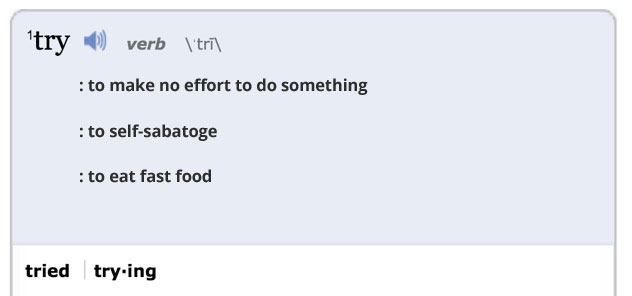|
People confuse the terms "normal" and "common," leading to what I call the average myth. It's this idea that commonplace somehow connotes goodness. Regularity somehow ends up meaning acceptable. This conflation makes us victims of the average myth. There are three incarnations of the average myth: deprecating reverence; deviance proclamations; and guru fairy tales. Deprecating reverence - "That's so amazing. I could never do anything like that." - You recognize it's a great accomplishment; but you fail to realize that it was done by an imperfect, flawed, foolish, bumbling, stumbling human being not too unlike yourself. Yeah, be realistic. With zero background, it's unlikely that you will at 70 years old begin your first ever exercise regimen and win the very next Olympic Gymnastics competition. However, fear and pre-visualized failure are self-fulfilling prophecies. If another human has done it, you can do it. It's just a matter of will multiplied by time. Deviance Proclamations - "Well, that prodigy couldn't have had a normal childhood; that athlete's diet is just too weird; that successful person just has such an odd schedule." - Duh. You recognize that they're doing something different; but you have to vilify it so as to protect your own complacency and laziness. Again, deviance from the commonplace is what makes exceptionalism. When you say, "it's normal for people to eat like this, act like this, think like this, etc.," what you really mean is that it's common. Yes, it is common. Common isn't good, healthy or worthy of esteem. It is common to eat like crap. It is common to abuse your body. It is common to balk at hard work. Vilify the hard workers, the dedicated, the dutiful all you want; that vilified deviance you lament is the very grit which creates a bell curve. Feel free to sit in the fat bubble in the middle. But some elbow grease will have you soaring elsewhere in another quadrant. Guru Fairy Tales - "You can do anything you want. Just look at me, and here's how I did it with less than one hour per week, a two dollar budget and walking uphill in the snow both ways." - The premise is largely true, but the method is bull. I like to pick on Tim Ferriss for this example because, well, it's easy. I'll leave aside "The 4 Hour Work Week" nonsense, as plenty of others have picked it to pieces. And I'll stay just within my immediate domain of expertise: fitness. Tim Ferriss is this guru who has sold a brand whose message is basically "all the results without any of the work." The titles of his books say all. But the funniest thing about his 2010 "The 4 Hour Body" is that, although it contains a great number of good factoids on intense exercise, ultimately it's a sham. The overt claim is that about four hours of "smart" work is all that's needed for exceptional physical wellness. Now, keep in mind, Tim Ferriss has never GOTTEN INTO shape. He's a lifelong athlete, holds some world record for ballroom dance, is into mixed martial arts training, and, as of late, got into rock climbing. So when, pray tell, did he ever experiment with only four hours of activity getting him into superhuman conditioning? The obvious answer is never. Anyhow, the point is clear. Yes, you can do a lot more than you think. And yes, there is value in working smarter not just harder. But careful on your sources. Gurus are out there to sell a lie that is loosely based on some actual facts. You won't get where they are by doing what they claim. You will get to where they are by doing what they do. Unfortunately, in most cases, this means becoming a lying cheat. So, if you want to accomplish something big AND maintain some modicum of ethics, morality and humanity... you won't do it in less than an hour a week OR on a two dollar budget. You may have to walk uphill in the snow both ways, because, after all, that would be weird, abnormal, and uncommon. But you can do it, even if you thought it was too late in life to get started. Don't worry. That's normal.
2 Comments
I invite you to read on only if you are ready for tough love:
I've heard it from clients. I've heard it from employees. I've heard it from people. "I tried." No. You didn't. If success eluded you, chances are you haven't even tried trying. Trying means effort, executing the most basic steps which lead to an end goal. Any activity which moves you further from the end goal, by definition, is not trying. So out of your week of 168 hours, how many hours are spent directly actively moving toward your end goal? If it's less than 85 hours, you aren't trying, because you are spending more hours neutral and/or directly in opposition of the goal. First, consider business. Building any business is straight forward. The formula has never changed since time began: views/calls/introductions to connections, connections to leads, leads to sales, sales to give access to your product or service. Every company worth its salt has definitive equations from the front end of marketing to the back end of top line revenue. At Bally Total Fitness I would actually sit down with new trainers and we could calculate exactly how many people they needed to talk to every day in order to make however much money they desired and help however many people they wanted to help. All they had to do was talk to that number of people. That's it. Every trainer who did it was happy. Every trainer who didn't was complaining about some outward variable keeping him from being successful. But the truth is that no one ever prevented any of my employees from talking to members on the floor, calling members lists or chatting with people at any of the local businesses. It was only they who kept themselves from the first two and most important steps. But man oh man, would they swear up and down that they were trying so hard. They weren't trying at all. Next, consider clients. Every one of their goals is straight forward. The formula has never changed since time began: optimize hormone balance, move well and you will become as lean, fit, healthy and strong as you want to be. That's it. It's simple. All successful weightloss clients ever have improved their control of blood sugar and inflammation. There's no secret. There are ones whose nutrition wasn't great, and they controlled blood sugar through tons of activity. There are ones whose activity was low, and they controlled blood sugar through excellence in nutrition. Those who do both do so because they don't want to leave anything to chance. Those who do neither tend to talk a lot about how hard they've tried. Trying means working the steps. You aren't working the steps. The steps are not big difficult tasks. You either do them or you don't. There's no try. Ignoring call lists isn't trying. Refusing to talk to people isn't trying. Insisting on no marketing isn't trying. Eating candy at work isn't trying. Eating bread isn't trying. You aren't even trying. Stop saying you're trying. It's pretty audacious to eliminate the first two and most important steps and then expect a good outcome. You want the success without the fundamental? You want growth without marketing? You want to be lean without controlling blood sugar? No. Lottery winners are to be reviled, not glorified. Lucky breaks should be detested, not envied. Those born with silver spoons in mouth should be hated, not loved. Earn it. Work. Execute. Really, truly try. Success without merit is the highest form of weakness. So don't even covet such a thing. They who've had it don't deserve it. And neither do you... until you try trying. In fact, only professionals choke. The word itself connotes that you operate at a level wherein you contend for the top position in the world. While vying for it, you missed, or "choked."
It just happened to Brazil. It just happened to a hot dog eating competitor. But if it just happened to you (and you're alive) there's no need to hang your head in shame. For one, you had the opportunity to choke, which in and of itself speaks volumes for the hard work and dedication you've put in up to this point. Two, in many cases you don't have to wait another four years for another opportunity. Yes, yes, I know. This particular opportunity "will never happen again." This is true almost none of the time, even for a 90 year old who missed the last Halley's Comet. There are other comets. And, guess what: thanks to technology, we can see everything ever recorded at pretty much any moment. No matter what happens, you can always focus your energy on what you don't have, what you missed out on, what you wish you had. That's a primer on how not to be powerful, happy or successful. It may sound like something from Tony Robbins, but it is true. If you had everything you wished for, you still wouldn't have everything that you WILL wish for once you get it. The secret to happiness is wanting less. Nevertheless, in this particular situation, I'm sure you're looking for something to get you close to the sensation of accomplishment you were hoping for and which just eluded you. The same advice applies, plus my question for you is "what now?" You see, the story isn't over, ever. If you had just won the lottery you'd still be faced with how to keep the piranhas away, protect yourself, your family and your identity. If you had just nailed that job, now you'd be faced with how to be great at it every day. If you just beat your competitor, you'd still be faced with the next challenge. Each moment, each minute, each hour, each day you are still going to be faced with "now what?" Whether you choked or won, you still face the same question. You have to go DO something. Something else. No matter what. So, sitting, inactive, impotently lamenting the loss, the choke... that's not what pros do. It's not what winners do. And it's not what you're going to do. Nothing is ever as it might first seem. So allow yourself to take a chance and mold the world to how you would have it be. Think of how you imagined your life a year ago, five years ago, ten years ago, before you directed yourself to where you are. Did it all turn out the way you thought it would back then? Think back to what you thought it would be like to go through the various rites of passage before you went through them. Your fitness and wellness journey is no different, and will be no different in the future. Serendipity steps in. You learn more. You take the reigns or give them to others. And, truth be told, it can end up being so much better than you expected. I'll give just two illustrations of seemingly impossible circumstances where the outcome was nothing like what one likely expects. In doing so, I want the reader to consider his/her own seemingly impossible roadblocks (not just in your fitness goals, but whatever struggle you may be having in life). However, reconsider them. If these two examples show you anything, it's that you too can get past your roadblocks to something unimaginably wonderful. The picture above is of one of my clients who is the team lead for the American Men's Greco-Roman wrestling team on her trip to Iran for the 2014 World Cup. When she returned she regaled me with a hundred stories about how repeatedly pleasantly surprised she was at her interactions in Iran, and how the Iranians were repeatedly pleasantly surprised at the interactions with her. In a nutshell, each party underestimated the respectfulness, gentility, humility, piety and cultural sensitivity that would come from the other. And it resulted in her having a "media darling" week in the country of Iran. As I listened to her debrief throughout the week, it kept occurring to me that her Persian expedition was not too dissimilar from a fitness journey. That is, with a little bit of guts and taking a chance, beautiful impossible things happen. Almost every part of her trip was historic, in that a woman had never been in various buildings and forums where she went. And "knowing" what she thought she did beforehand, she could've easily just forewent the tour, stood this one out, played it safe and stayed home. The Iranian government could've easily declined entry and the various concessions they had to make to accommodate her. Instead, both boldly proceeded and people's worlds changed. Prior to my client's return, two weeks ago, I myself was overseas; and my son was standing on a canon outside the mansion once home to Laskarina Bouboulina (whose statue is next to him). Born in 1771 Bouboulina was the only woman in recorded world history to be named a full admiral until 2013. She had no female role model after whom to model herself. She could've easily said, "this is how things seem to be" and accepted her plight. But instead she challenged every imagined imposition in her path, amassing a furtive arsenal on the island of Spetsos, chartering the construction of one of the largest ships at the time, bribing Turkish officials to look the other way, and launching a series of offensives against the Ottoman Empire to ultimately play a pivotal role in the Independence of Greece. She was born to be just another Greek woman (in fact, she was born in a prison), quietly oppressed by the Turks; but she imagined and created something so much greater. Even when she had acquired a large estate, she was not content to stand back and enjoy retirement. Rather, she personally attended to brutal battles at the ripe old age of 50, which is REALLY saying something for a woman in the early 1800s.
Nothing is as it seems to begin with. And that's because you make things what they are. Holding back from a full commitment to your fitness is just like holding back from the rest of life. You think you know what it's like, so you shoot yourself in the foot before you take a step, and now you dare not put it forward because it could get hurt worse. Yes, it requires doing what maybe no one including yourself thought possible. But you know what? EVERYTHING EVER DONE once seemed like it couldn't be.  Even the Royal Society now concedes: genes aren't the explanation for the diversity of life; rather they are "merely a means of specifying polypeptides." In the recent paper, whose title says it all, "Genes without prominence: a reappraisal of the foundations of biology," the authors highlight that the incredible complexity in biology is summarized as follows: "everything depends on everything else, and phenotypes are emergent properties of their systems." What This Means: The observable characteristics and behaviors of any organism, humans included, are an infinitely complicated result (i.e. - an emergent property) from countless actions, interactions, and reactions (i.e. - systems); and no one culprit (least of all genes, let alone a single gene) runs the show. More importantly, this is the death knell for the belief that you cannot change. As already pointed out in the previous post, Genes Don't Make You Fat, a total externalization of self devolves into incoherence. Consider this line of reasoning: I'm not responsible for having that drink, the devil is, my genes are, my Freudian complex is, the society I live in is, Obama is, Fox News is, the Big Bang is, the Multiverse is, the alignment of the stars is, the lunar cycle is, etc. Even if we could prove some non-self blame game, what would be the practical long term benefit of believing in it? Human progress is about controlling nature, not looking for every conceivable way to not control it. Presence and Expression Are Not The Same: Think of the genome as a banquet hall. Everything in it, the attendees, the silverware, the cups, the punch, the entertainers, are genes. Knowing every detail about every attendee, every type of food present, every chair will not tell you what happened at the banquet, its purpose, or who did what with what or whom, or even how, when or why. Just because Pavarotti was there does not mean that he sang Nessun Dorma at 9pm, nor whether the deaf attendees enjoyed it, if they were still awake, nor whether anyone of the deaf attendees is a writer for the Times, nor whether any Times' subscribers cited it on their own blogs, nor whether it was a blogpost that went viral with Facebook likes. That Pavarotti's assigned seat was next to Sammy Davis Jr. might be of interest, but not if Sammy got sick and left the party before he had a chance to talk with anyone. If Sammy did leave early, did Pavarotti know about the extra slice of cake; and, if so, did he eat it or turn it down? How Epigenetics Crushed the Gene Myth: You need only one example to wrap your head around this: bees. The worker bee and the queen bee are GENETICALLY IDENTICAL. There isn't one single gene dissimilarity. Not one. That is to say, their banquet halls are set in the precisely same way down to the placement, angle and fold of each individual napkin. Not even one salad fork is a nanometer different than its counterpart in the other banquet hall. How Mutation Crushed Our Hope in DNA: It's fair to say that many once hoped the study of heredity and DNA meant we had acquired the lynchpin to understand and control all of biology. However, for over 100 years the fruit fly has been relentlessly pummeled with mutation, environmental pressures, and specific countless genetic alterations in innumerable ways in myriads of laboratories, the results of which are... fruit flies. That's right, they may be a really sickly, normal, or dead fruit flies; but changing their DNA can't turn them into a horse fly. Thus, DNA also doesn't provide the comprehensive explanation for why they are a fruit fly at all. Monumental genetic mutation and DNA alteration does not even seem to impact basic body plans for a particular organism. Because of this, the field of epigenetics has come into being and many researchers are now looking to the role of the "membranome." How ENCODE is Turning the World Upside Down: If we return to the banquet illustration, the discovery of DNA was like becoming aware that banquet halls exist in buildings. Knowing they were there, we could open the doors and look inside. The next 50 years we spent cataloging the contents of banquet halls, one in particular (that of humans). Within that time we surmised that the only important part of the hall was the caterer's detailed buffet plan and the rest is junk, leftovers from various attempts at making banquet halls, some successful, some less so. That caterer's buffet plan is responsible for the layout of the buffet, accounts for about 1% of the banquet hall contents, and is very similar from banquet hall (humans) to banquet hall (chimps). A project entitled ENCODE started in 2003 with the aim of finding out what purpose the other 99% of the banquet hall and its contents might have. Needless to say, what they've found is extremely complex - everything likely plays a role, and every role can change depending on what food is brought in through the kitchen, how the ventilation system works, what the restroom upkeep is like, and on and on and on. Why This is Important: There are few beliefs (maybe none) more empowering than the understanding that you can choose to be whatever you want. It's the bedrock understanding of a free society. Beyond that, it's true. Every 1/43rd of a second genetic transcription occurs, meaning that you literally become a different person every moment. And, in each moment, the sum adding up over time, you can "choose" (also a very complex system of actions, interactions and reactions) who next you'll be. As such, there are few beliefs more disempowering and pernicious to the human spirit than determinism. In my previous post of why genes don't make you fat, I took on this dark ages myth as it applies to losing weight; but that post did not go far enough. Think back to the queen bee. Remember, her genes are no different than those of her attendees or drones. Somehow, through a process so complex we call it random, "she" is selected to consume royal jelly continually. The royal diet suppresses the expression of certain genes and allows for the expression of others, resulting in not just structural and functional differences, but behavioral and selection preference differences. Why We Keep Getting Sucked Back in: Genetic determinism is just another attempt at outsourcing responsibility. The logical conclusion of any determinism is that something else way down the line did it. Though seemingly more contemporary and in vogue, genetic determinism is no different than all its predecessors whose logical conclusions were bigotry, slavery, apartheid, the caste system, and extermination of "others." Consider: Deterministic X made me superior; deterministic Y made you inferior. Insert whatever you want in place of X and Y and it doesn't give us any reason to think we can, could or should change. But if determinism in any form is such apparent nonsense, why do we keep reformulating it? This is perhaps a bit too philosophically hefty, but let me venture a guess. We want simple and elegant answers. Life is neither; so it's answers are most likely messy and overcomplicated. Despite that, we seek a path of reductionism, explaining psychology by biology, biology by chemistry, chemistry by physics, and physics by physical laws, which are merely descriptions of how the tallied constituent bosons and fermions act. Why do they act that way? Well, just ignore that question. In quantum mechanics, theorists have admitted defeat in trying to concretely explain the most fundamental particles, coming up with very sophisticated abstractions like superposition, entanglement and uncertainty. Remember, these abstractions are supposedly the floor level of why you are the way you are. Never mind that at the bottom of reductionism is our understanding and estimation of the basic, the very formulation of which is derived from actions of the mind (i.e. - reason, observation, testing, prediction, etc.) or more properly psychology, the same point at the top of the reductionism tree that we were hoping to explain. This annoying little bugbear of a paradox shows you that there is no such thing as a drawn line of reductionism, but more so a circle of evaluation. Then, when one adds to the mix the confounding concepts of consciousness, mind, change, freedom, will and effort, well, it gets really difficult to neatly explain or explain away outcomes via reductionism anyway. Determinism is anti-science. At least in biology, it is neither empirical (we cannot repeatedly test, observe, verify or falsify it) nor pragmatic. We can't get to it by means of reductionism; it just seems like we must. It is an assumption, an unproven and unprovable article of faith, an axiom upon which we fit the data. It is a wall, beyond which there is no inquiry, no challenge, and no choice. Thus, its explanatory power is bankrupt. Worse, it carries no weight to compel a better self. Everything just "is." There's no "ought." But isn't that its charm? Isn't that its elegant appeal? Determinism is agelessly wrong, but yet simultaneously amenable to every current popular trend. And I think that's how we keep getting sucked in. What You Can Do About It: Remember the queen bee? You know how she becomes the queen bee? Royal jelly. Great. But do you know how she stays the queen bee? By acting like one. What does that mean? Among other things, she keeps eating royal jelly. You see, it isn't enough to select a certain outcome in the banquet hall for a day, a week, a month. If you have accorded a certain function and purpose, the opposing epigenetic expressions to hold your new course must be more than commensurate to the previous inclinations. More plainly, you have been expressing the genes that have put you where you are for a certain amount of time. You must express the genes that will put you where you want to be for at least as long. If you want to be the queen bee, eat Royal Jelly for at least as long as you haven't been.  Follow-up: It's a critical component of business, fitness and goodness. Though you may find the first two unremarkable, the latter may be a little unexpected. However, the very recent passing of a former client made the ubiquity of the goodness of follow-up really dawn on me. When I first entered management about a decade ago, I found that running a successful team without deleterious influences relies heavily on follow-up. You see, a lot of people pay heavy lip service to setting proper expectations. And that is true, especially as the team you manage grows. But expectations are worthless without revisiting them, evaluating performance in light of them, and the like. Likely, many people steeped in the business world know this well. Even just in sales, many a successful sales rep knows that their paycheck is contingent on how well they execute follow-up with leads, especially dried up cold leads, former buyers, ex-partners, etc. But follow-up goes beyond that. As you may have caught, by the title and intro, I see something greater in follow-up. I'm not just talking about having performance reviews with employees or calling old prospects. I don't just mean to say "keep up your network." In fact, as far as fitness is concerned, I'm not even talking about accountability and tracking. When following-up with yourself, I'm not just talking about how to keep yourself on track. I'm talking about the connected worldview. That is, follow-up itself is an affirmation of the wholly implausible belief that things can, will and/or should change. It is a faith in the possibility of humanity. When you follow-up you are exercising an impractical hopefulness that people will change, that the negative worker will become an achiever, that the depressed client will finally commit to wellness, that you can affect goodness, that giving up isn't just bleak, it's unacceptable. As such, follow-up is a tangible credit to the possible, to hope, to change. Paradoxically, the seemingly impractical becomes essentially practical. Three days ago, a good friend of mine sent me an article written by a strength coach who was bragging about how he's so glad he never was in sales, and, therefore, in his opinion, he never had to fake being interested in people or listening to their excuses and equivocations. The next day I received the news that a former client whom I had stopped trying to call about a year ago (because he was no longer responding) had ended his own life. Now, I have dozens of examples of unlikely people whom I never gave up on; and years later finally had a breakthrough. But just one example like this really sticks in my craw. Follow-up is an imperative for those of us who would create a better world. It should not be a number on a list. It has nothing to do with making a sale or being fake. It cannot be reduced to a function of keeping up your network. It is not a mechanistic method for keeping yourself accountable. It is something far greater than all of those: it's a part of being good and a genuine caring for others. It is part of a worldview that believes in making good. Do not be disheartened when people hang up on you. Do not give up hope when it seems like the path doesn't end. Do not worry about being viewed as a relentless bother. Don't allow people to bully you out of your work by charging you with ulterior motive. Follow-up with: that almost-forgotten New Year's Resolution; that former complaining customer; that unyielding debater; that despondent employee; that estranged family member; that judging critic; that long-lost friend; that "who-I-used-to-be;" that non-compliant team member; that tail-spinning stranger; that lost familiar; that straying youth; that disempowered elder. Follow-up. Follow-up. Follow-up. It is the goodness imperative. Follow-up tirelessly, happily, unendingly. Someone's very life depends on it. |
Elev8 Wellness
|
LIVE. AWESOME.We offer the highest quality in personal fitness, nutrition, and mindset coaching, helping you achieve your fitness, health, wellness and performance goals no matter the obstacle. With virtual online training and private, in-studio training we make it easier to reach your wellness goals safely.
No more can't. No more not good enough. If you compete in a sport, let your mind no longer hold you back from being the greatest. If you don't, let your mind no longer hold you back from being the best version of you that you can be. Sign-up for a Tour Covid Screen Waiver Elev8 Waiver Become an Elev8 Instructor Space Rental |
6244 lyndale ave. s., minneapolis, mn 55423
|
© 2021 Elev8 Wellness LLC. All Rights Reserved. site map | contribute | SITE BY Sproute Creative






 RSS Feed
RSS Feed
